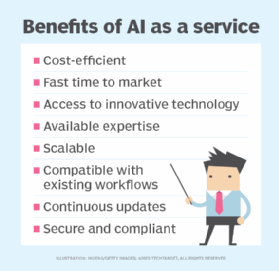8 benefits of AI as a service
Some businesses lack the resources to build and train their own AI models. Can AIaaS level the playing field for smaller organizations to remain nimble?
The proliferation of AI provides an advantage to organizations that can create and train their own models. But how can smaller businesses maintain a competitive advantage in the market?
Cloud-based AI as a service (AIaaS) enables organizations to explore, integrate and scale AI techniques at a reasonable cost. Businesses can bypass the substantial investment of on-premises hosting and maintenance of AI hardware and gain ready access to prebuilt, trained models tailored to perform specific tasks.
The benefits of AIaaS can accrue exponentially with the fast pace of AI development and its increasingly sophisticated features. Let's explore some of the benefits AI in the cloud can provide businesses and find out if AIaaS could be the resource your organization needs.
Businesses should consider the following key benefits of AIaaS adoption as they plan their next steps.
Cost-efficient
While AIaaS is more expensive than standard cloud services, it costs considerably less than purchasing GPUs and servers. For example, the price for a DGX H100 BasePOD from chipmaker Nvidia, as well as a SuperPOD, can climb into the millions of dollars. More affordable AIaaS offers three entry points:
- The AI application level.
- The platform level for engineering and building machine learning (ML) models.
- Prebuilt model adoption customized with proprietary data.
AIaaS eliminates the need for substantial upfront investments, offering access to powerful AI tools at a fraction of the cost required for on-premises hosting. Moreover, companies avoid the need to ramp up their infrastructures with numerous capabilities when they might only need a few deployments.

Fast time to market
Renting services from an AIaaS provider represents the best option for fast deployment. Organizations save on the investment of time required for data preparation and model development, eliminating the IT burden and freeing up resources to focus on active AI implementation. In many instances, business professionals can use AIaaS resources without having to undergo training.
Faster time to market is vital for companies to stay competitive and relevant in the market. Maersk reported that one of the best ways for businesses to optimize their speed to market is to rely on automation. By using AIaaS to automate simple tasks, teams can allocate staff resources to more complex issues.
Access to innovative technology
AIaaS provides equal access to competitive resources, opportunities and conditions. Most providers offer a rich array of prebuilt tools and connectors to integrate AI and jump-start AI projects, often with minimal programming. These can include chatbots in e-commerce, fraud detection in finance and predictive analytics for IT operations.
While service providers often feature a diverse portfolio of AI tools and services, some concentrate on specific areas. For example, Google Cloud AI specializes in data analytics, offering tools such as BigQuery and AI Platform. On the other hand, Oracle Cloud Infrastructure offers advanced GPU technology, ideal for large volume data processing.
Available expertise
Organizations that adopt AIaaS no longer require a team of data scientists or complex infrastructures. Instead, they can start deriving value immediately and rely on experts to ensure ease of use and seamless functionality, whether these projects entail advanced natural language processing (NLP) instances or ML models.
An AIaaS deployment includes full management support, engineering expertise and data preparation, which help offset the substantial time and IT effort required to process massive volumes of unstructured data and to train models. Certain vendors can also provide specific industry knowledge to address certain types of project challenges, like model training for image recognition, data analysis, NLP or predictive analytics.
Scalable
Businesses across every economic sector often contend with service peaks, drop-offs and rapid growth. AIaaS providers ensure flexibility and scalable AI solutions that can quickly adapt to changing needs. AI systems can seamlessly handle data volume increases, expansive numbers of users, changing requirements and evolving business goals.
The ability to scale as needed over time represents a key requirement as technical needs change and IT operations grow more complex. One of the major benefits of cloud computing is the ability to quickly scale to meet demand. An organization's AI service should include the same functionality.
Compatible with existing workflows
AIaaS offers a range of capabilities that can be integrated within workflows to automate certain tasks, accelerate decision-making and improve efficiency. Businesses that store their data in the cloud also gain advantages because they can eliminate the need to build network pipes and migrate on-premises data to the cloud.
Certain vendors, such as Oracle and Microsoft, have integrated AI across their cloud-based and on-premises business applications. Treat AIaaS like an experimental playground to test and integrate AI features to enhance current capabilities.
Continuous updates
Successful AI initiatives depend on ML models that are developed, tested and deployed consistently and reliably. Moreover, AI capabilities and the services to support them must evolve to handle new business strategies and deployments. AIaaS offers resources to support AI initiatives that become more complex and guarantee performance targets over time.
Continuous support through means like chatbots and 24/7 access to vendor and product experts can be crucial. Consistent, routine updates of AI models also ensure that AIaaS subscribers can maintain their competitive edge with the latest features.
Secure and compliant
All the major AIaaS providers implement fail-safe security measures that protect user data and meet compliance standards. These include encryption protocols, access control and data residency protections. In addition, service providers adhere to regulations that require data used to train AI or large language models to be collected and used legally and ethically.
In addition, data governance and compliance for AI models, as well as vendor certification, are important for subscribers in highly regulated sectors, such as finance, insurance, government and healthcare.
Kerry Doyle writes about technology for a variety of publications and platforms. His current focus is on issues relevant to IT and enterprise leaders across a range of topics, from nanotech and cloud to distributed services and AI.







